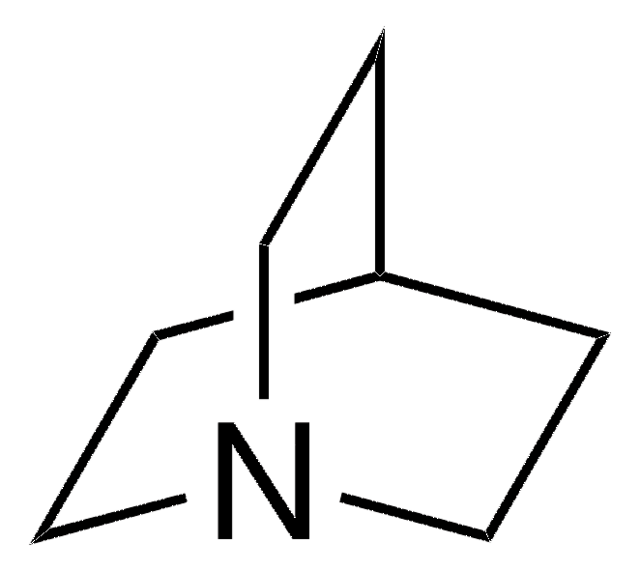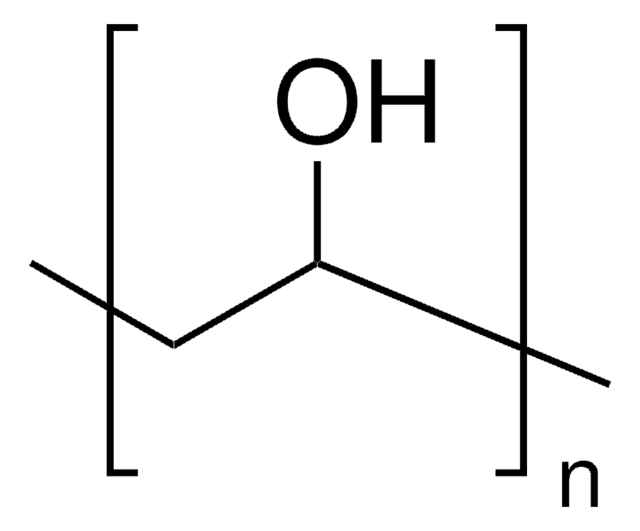8.03456
1,4-Diazabicyclo[2.2.2]octane
for synthesis
Sinonimo/i:
1,4-Diazabicyclo[2.2.2]octane, Triethylenediamine, DABCO
About This Item
Prodotti consigliati
Tensione di vapore
0.68 hPa ( 21 °C)
Livello qualitativo
Saggio
≥98.0% (GC)
Forma fisica
solid
Temp. autoaccensione
350 °C
Potenza
700 mg/kg LD50, oral (Rat)
Caratteristiche più verdi
Catalysis
Learn more about the Principles of Green Chemistry.
P. eboll.
173.4 °C/1000 hPa
Punto di fusione
155-158 °C
Temp. transizione
flash point 62.2 °C
Solubilità
400 g/L
Densità
1.14 g/cm3 at 25 °C
Densità bulk
800 kg/m3
Categoria alternativa più verde
Temperatura di conservazione
2-30°C
InChI
1S/C6H12N2/c1-2-8-5-3-7(1)4-6-8/h1-6H2
IMNIMPAHZVJRPE-UHFFFAOYSA-N
Categorie correlate
Descrizione generale
Applicazioni
- Biocompatible Polymer Composites: Research demonstrates the development of a reactive compatibilization method using 1,4-diazabicyclo[2.2.2]octane as a catalyst for the preparation of polylactic acid/poly(butylene adipate-co-terephthalate)/thermoplastic starch ternary bio-composites. This approach significantly improves the mechanical and biodegradable properties of the composites, suitable for environmentally friendly applications in the packaging and automotive industries (Fang et al., 2024).
- Cobalt Single-Atom Catalysts: Research on the development of cobalt single-atom catalysts encapsulated in a metal-organic framework using 1,4-diazabicyclo[2.2.2]octane. This catalyst shows exceptional efficiency in the oxygen reduction reaction, important for energy conversion technologies such as fuel cells and metal-air batteries (Gao et al., 2024).
- Advanced Analytical Techniques: Study on the use of 1,4-diazabicyclo[2.2.2]octane in advanced derivatization techniques for the analysis of Novichok agents in biofluids using LC-MS. This research contributes to the field of forensic science and chemical warfare agent detection, providing robust methods for emergency responses and public safety (Yamaguchi et al., 2023).
Risultati analitici
Water (K. F.): ≤ 1.0 %
Identity (IR): passes test
Avvertenze
Danger
Indicazioni di pericolo
Consigli di prudenza
Classi di pericolo
Acute Tox. 4 Oral - Eye Dam. 1 - Flam. Sol. 1 - Skin Irrit. 2
Codice della classe di stoccaggio
4.1B - Flammable solid hazardous materials
Classe di pericolosità dell'acqua (WGK)
WGK 1
Punto d’infiammabilità (°F)
144.0 °F - closed cup
Punto d’infiammabilità (°C)
62.2 °C - closed cup
Certificati d'analisi (COA)
Cerca il Certificati d'analisi (COA) digitando il numero di lotto/batch corrispondente. I numeri di lotto o di batch sono stampati sull'etichetta dei prodotti dopo la parola ‘Lotto’ o ‘Batch’.
Possiedi già questo prodotto?
I documenti relativi ai prodotti acquistati recentemente sono disponibili nell’Archivio dei documenti.
I clienti hanno visto anche
Il team dei nostri ricercatori vanta grande esperienza in tutte le aree della ricerca quali Life Science, scienza dei materiali, sintesi chimica, cromatografia, discipline analitiche, ecc..
Contatta l'Assistenza Tecnica.![1,4-Diazabicyclo[2.2.2]octane ReagentPlus®, ≥99%](/deepweb/assets/sigmaaldrich/product/structures/366/129/a6ff4175-974d-4fac-9038-b35e508ef252/640/a6ff4175-974d-4fac-9038-b35e508ef252.png)
![1,8-diazabiciclo[5.4.0]undec-7-ene 98%](/deepweb/assets/sigmaaldrich/product/structures/120/564/5b373e23-1624-489c-8efb-692de0f96ffb/640/5b373e23-1624-489c-8efb-692de0f96ffb.png)


![1,5,7-Triazabicyclo[4.4.0]dec-5-ene 98%](/deepweb/assets/sigmaaldrich/product/structures/171/446/333d560c-cff6-4958-b489-5acfb3057cce/640/333d560c-cff6-4958-b489-5acfb3057cce.png)







![1,5-Diazabicyclo[4.3.0]non-5-ene 98%](/deepweb/assets/sigmaaldrich/product/structures/400/401/859b2474-712b-4448-b231-74d0bc3203f1/640/859b2474-712b-4448-b231-74d0bc3203f1.png)
![1,8-Diazabicyclo[5.4.0]undec-7-ene for synthesis](/deepweb/assets/sigmaaldrich/product/images/219/652/f12d7266-2d82-4869-9d8d-919b0f68de68/640/f12d7266-2d82-4869-9d8d-919b0f68de68.jpg)